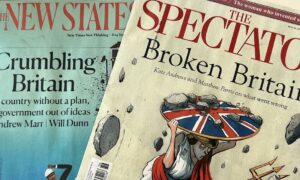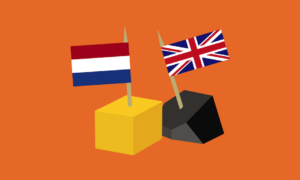In June 2016, Britain voted to leave the European Union after a small group of nationalists sold British voters a simple message: Brexit will be a quick and easy return to greatness.
It wasn’t.
Former Prime Minister Theresa May repeatedly tried – and failed – to renegotiate leave terms acceptable to the European Research Group, the far-right block of Tory MPs who demand a hard Brexit.
Boris Johnson succeeded where May failed and the UK is free, FREE! of EU tyranny. Questions remain, however, if it’s free of EU regulations because Johnson’s agreement is limited to free trade in goods.
There’s a lot more to work out including web-related technical issues.
And that, as our Nina Avramovic put it all those years ago in her prescient post “Dear Brits; This is what it’s like to be a non-EU citizen,” means living in a whole new world of uncertainty, with limitations on travel, work and education.
The bottom line, and there’s always a bottom line: A country outside the customs union cannot have the same rights and benefits as an E.U. member state.
If you’re an expat – especially a British expat – what does all this mean?
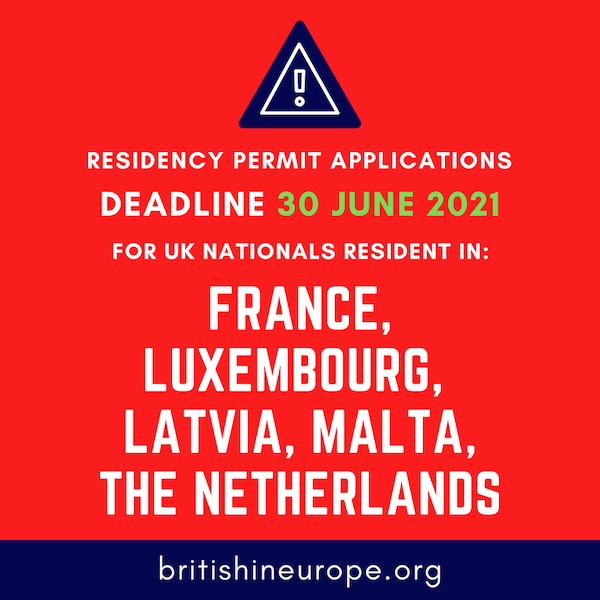
Here’s how Brexit is impacting expats across Europe:
• There have been so many Brexit deadlines that we lost track of a very important date coming up – 30 June. That’s when all European Union citizens who haven’t received settled status technically are in violation of post-Brexit British immigration rules. The British have gone hard-core lately, detaining and deporting EU citizens from Spain and other countries who arrived without work permits.
British expats who don’t have long-term residency status in France, Spain and other countries could face the same treatment after 30 June.
The Guardian has a recent post that suggests one in 10 EU citizens in the UK is likely to leave. That’s according to research from the Independent Monitoring Authority for the Citizens’ Rights Agreements. From that survey, most likely to leave are German, Spanish or French males between 45 and 74 years old who live the northeast or southeast of England and who earn less than 50,000 pounds per year.
The problem is, Britain’s farming sector is reliant on foreign workers, with people from Eastern Europe making up to 70 percent of the workforce at meat processors, most of whom – with weeks to go – haven’t even applied for settled status. If they do, it will add to the backlog of 320,000 applications already in the Home Office pipeline. Meat producers and others in the food industry are considering offshoring the work to low-wage/high-skills countries in Europe.
• In order to make itself English again, the United Kingdom is offering European Union nationals – and all migrants, really – cash to voluntarily hit the road before 30 June. It’s not a terrible deal. The offer is – if they’re qualified – up to 2,000 pounds to relocate, find a new job or start a business in the immigrant’s home country.
You can see all the details here.
This offer was originally targeted at non-EU types who’d overstayed their student visas or whatever. As the Guardian reported, this offer comes at the same time a reports finds that a lot of key workers might be about to get sent home involuntarily. Those people from Poland, Romania, Bulgaria and other EU countries work in nursing homes and hospitals, construction, manufacturing and agriculture and a lot of them have never registered for permanent status, the report notes. If they don’t – and they don’t take the repatriation offer – Britain is going to have yet another Brexit mess on its hands, with thousands of illegals to find and deport.
Government officials respond that almost 5 million people have applied for permanent status and that the system works. We will see.
• It took mere hours for airlines to start denying boarding to U.K. citizens trying to fly to Netherlands, France, Germany and Spain. The issue is whether those Brits still have a right to travel as E.U. citizens. Which they aren’t anymore. BUT, it’s complicated …. For example, Spanish and British authorities have said a (now invalid) certificate of E.U. citizenship along with a foreign national identification number issued by Spain are sufficient for British nationals residing in Spain, according to Sky News.
Legally, though, the airlines have to observe the national travel rules each country issues vis-a-vis the pandemic. And the E.U. has a rule forbidding travelers coming from outside the bloc to enter unless their travel is essential. Which technically speaking includes Brits now.
A lot of this goes back to lack of clarity regarding which documents establish residency and what defines “essential” travel. The Sky News post refers to the new TIE documents in Spain and how Spain is struggling to meet demand from British expats for the green certificate of residency card.
But a lot also goes back to Brits’ inability to understand how Brexit made them not more important, but third-class citizens in the global scheme of things. The Daily Express has an account of Swedish officials telling an unfortunate British traveler she was being denied entry “because you’re like every other country now – like Turkey’.”
Ouch.
• Talk about cutting off your nose to spite your face. A report by The Nuffield Trust, a non-profit, independent healthcare think tank, states that restrictive Brexit migration policies will damage the U.K.’s healthcare sector by blocking administrators from hiring staff from the E.U., “exacerbating dire workforce shortages.”
This will remain a challenge even after the pandemic because the U.K. has rapidly aging population. By 2050, it will have an additional 8.2 million people aged 65 years, according to the government’s own data.
• Money is the driver of every global issue and Brexit is no different. In a no-deal scenario, U.K.-based banks lose “passporting,” their right to do business in the E.U. That’s already manifesting itself in “Dear client” letters from Lloyds, Barclays and other banks and mortgage lenders telling British expats in Spain, the Netherlands and other E.U. countries their accounts are going away. (See Rachel Arts’s post about scrambling to find a Dutch bank here.)
The winners in this financial upheaval are the virtual banks, according to the Financial Times, with TransferWise, Revolut and other adding significant numbers of new customers.
• The U.K. and Spain have wrangled over the British Overseas Territory of Gibraltar for decades. With parallel negotiations to Brexit, it appears Spain establishes dominance. Under the terms of a pending agreement, Brits entering The Rock will have to go through passport control because Gibraltar will join the Schengen Zone. Spaniards and other E.U. citizens will be able to come and go as they please.
El Pais in English notes that Gibraltarians “have never had this kind of open access to Europe, as the U.K. never signed the Schengen agreement. From Gibraltar airport, it would also be possible to fly to the 26 members of Schengen.”
Until now, only Gibraltarians and British citizens were allowed to live and work in Gibraltar without a residence permit. About 9,200 Spanish workers and EU citizens cross into Gibraltar, which is technically the UK, each day to work.
• British expats flying or sailing to the Netherlands – you’ll need a valid negative Covid-19 test and a negative test declaration form to enter the country starting 1 January 2021 since you’ll no longer be an E.U. citizen. That requirement for other non-E.U. countries started 15 December and people from Orange or Red countries won’t be allowed to enter at all.
This doesn’t apply to travelers passing through airports or ports on the way to a final destination.
• Britain took live its new immigration application system on 2 December. The U.K. closes the doors to E.U. citizens unless they meet a number of criteria in a points system, according to the BBC.
Those criteria include points for English skills and a job offer “at the appropriate skill level in an eligible occupation. The threshold minimal salary is at least 25,600 pounds though allowances will be made in hard-to-fill skills sectors.
Application fees range between 610 pounds and 1,408 pounds.
• The Brexiteers are just coming to terms with what Brexit actually means. The Sunday Times has a detailed post about how new rules – British citizens will only be allowed to stay 90 days out of every six months – will deprive Brits of their God-given right to long summers in the sun.
On 2 December 2020, the Daily Mail has a scathing post about how Brits with second homes in Greece or wherever will be CHEATED out of going there at their leisure by the fact that they’ll now be limited to 90 days in the Schengen Area out of every 180 since they are, you know, no longer E.U. citizens.
The Daily Mail and Express are looking into this matter, DEMANDING the rules be changed. A spokesman for the prime minister basically told the Mail reporter, “Sorry about your luck … that’s Brexit.”
• So, where are they?
That’s the question Dutch officials are asking themselves after about 6,000 out of about 35,000 British citizens failed to respond to invitations to apply this summer for long-term residency.
The Dutch immigration service IND approved about 25,000 applications and rejected just 25 people, according to the DutchNews.nl. The post quotes a British expat group as saying a lot of Brits in the Netherlands don’t know that after 1 January, they’ll no longer have the right to stay, which we find difficult to swallow. Just what Dutch immigration officials will do isn’t clear and as Dispatches is based in the Netherlands, we know there will be months of discussions toward a consensus. But deportation is an option here and in other EU countries.
The Dutch aren’t alone. The French never registered British expats because they were EU citizens, so they have no reliable data about how many are permanent residents. With Brits required to have carte de séjours after 1 January, the French are only now opening a registration portal. Again, if the process goes badly, British expats could be looking at a one-way trip home. And that brings up another issue.
Those Brits with spouses and children who are EU citizens will have to qualify under an means test to relocate them to the UK after Brexit. British spouses will have to prove they earn at least 18,600 pounds annually if they are to bring an EU-nationality spouse or partner to live with them, plus 3,800 pounds for a first dependent non-British child, and 2,400 pounds for each additional child.
So that would mean a returning family of three would have to prove they earn at least 24,800 pounds per year or the family would have to stay behind … or again, face deportation.
• It always comes down to money, doesn’t it? London-based Barclays is telling its British expat credit card holders in Spain and France that because of Brexit, the financial services giant will close their accounts if they don’t have a permanent address in the United Kingdom.
A bank spokesperson told The Connexion that customers whose Barclaycards are not linked to a UK residential address will see their account closed on 16 November.
The British Bankers Association has warned that if the UK and EU fail to sign a post-Brexit banking agreement British banks will face “significant regulatory barriers” to providing cross-border services to EU-based British clients.
With Boris Johnson tearing up the Brexit agreement, it looks likely a major Brexit complication – no new financial agreements to replace the nine EU “passporting”rules – will make it more difficult for British financial institutions to do business in the EU. Or as the British Banking Association puts it, “These passports are the foundation of the EU single market for financial services.”
That said, Barclays and most other British-based banks and multinationals are moving the majority of their operations to EU countries such as the Netherlands. Barclays now has markets operations in Ireland, France, Spain, Italy, Germany and the Netherlands as well as in London.
• Europe’s history has been one of different groups on the move since the Stone Age. When it’s all said and done, Brits are a blend of Celts, Vikings, Romans, with African and Asian roots thrown in. That trend continues with Brexit as more Brits are becoming Dutch.
The Dutch News has a post about the number of Brits in the Netherlands increasing by 10,000 people since 2016. And of that group, more are taking on Dutch citizenship, about 2,500 just last year.
The Netherlands is now home to about 100,000 British nationals, half of whom first generation migrants, according to figures from the Dutch national statistics office, CBS.
Now, multiply this trend across Europe in Spain, Portugal and Germany.
• We titled this post “Domino Effect” all those years ago, and we looked at all the secondary and tertiary effects. But no Brexit domino would fall harder than Scotland declaring independence.
First Minister Nicola Sturgeon’s progressive policies on climate change and infrastructure are increasingly at odds with Boris Johnson’s nationalist instincts. Sturgeon lately has been acting like the leader of an independent country, issuing pandemic quarantine rules diverging from the U.K. and challenging Boris Johnson at every turn, frustrated with his coronavirus failings. Scotland, which did not vote for Brexit, has long vowed it will remain connected to the European Union.
If Scotland does break away, it would create an advanced country with more in common with the Nordics that Great Britain:
– An independent Scotland would have a population of about 5 million, similar in size to Norway and Denmark.
– Scotland is sparsely population, with a population density similar to Sweden – about 65 people per square kilometer. Scotland is nearly empty compared to England’s 275 people per square kilometer.
– An independent Scotland would have an energy sector comparable to Norway, with substantial oil reserves and renewables.
– Scotland has has highly ranked universities including the University of Edinburgh.
Scotland’s weaknesses include a lack of advanced manufacturing and a GDP half the size of Norway. It also lacks a tech ecosystem comparable to the Republic of Ireland.
But throw in the multi-billion euro value of Scotch whisky exports – 85 percent of the spirits leaves the country – and Scotland would still be a very tempting country for highly skilled internationals including more than a few British refugees from Brexit.
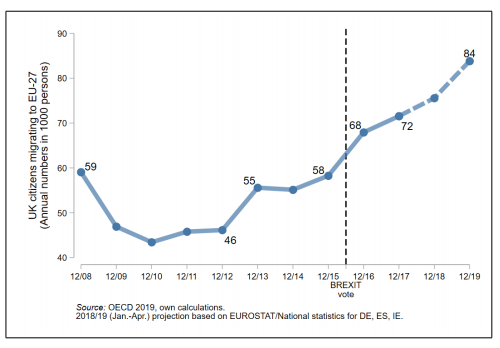
• A new study by a consortium of research groups finds the United Kingdom is experiencing a brain drain on a level that typically only happens during a war or national crisis.
The study by the Oxford in BerlinResearch Partnership – made up of Oxford University, four Berlin institutions and the WZB Berlin Social Science Center, finds the number of British people leaving the U.K. for continental Europe is at a 10-year high. More than 20,000 left for Spain, 10,000 to France, 11,300 to Germany, 5,660 to Ireland, and 5,510 to the Netherlands.
About half of all British citizens living in Germany will have dual U.K./German nationality by the end of 2020, according to the report.
The numbers are based on data from the Organization for Economic Cooperation and Development. Britons who decided to obtain E.U. passports has increased by more than 500 percent, by 2,000 percent in Germany.
The Guardian has the best summary of the report, which you can see here.
From that summary:
“We’re observing a new social migration phenomenon and a redefining of what it means to be British-European. In 2019, Brits came in just behind Turks in numbers receiving German citizenship – way ahead of Poles, Romanians, Iraqis or Syrians, whom you might otherwise expect to be more eagerly applying for German/EU citizenship.”
• With the deadline for an extension passing, more countries are alerting their British expats that changes are coming for long-term residence status. Expats in the Netherlands began receiving notifications at the end of July. More on that as we talk with Dutch immigration officials. But it’s likely Spain will prove the more difficult situation after the Johnson government threw the Spanish under the bus.
In July, British officials suddenly began requiring all British tourist returning from the Costa del Sol or wherever to quarantine, killing Spain’s chances of saving its 2020 tourism season. Will this be forgotten as Spain votes on a final Brexit agreement? Which is – granted – less and less likely. But what about the more likely scenario in which Spanish officials are hammering out new residency rules for the 300,000 or so British expats? Will they forgive and forget?
Not. Bloody. Likely.
• Talk about unintended consequences … if Brexit has accomplished anything quantifiable, it is redistributing financial talent from London to the Continent. The little Netherlands is the big winner so far after usually reticent Dutch policy makers at the Netherlands Foreign Investment Agency saying out loud they intend to use Brexit to strip London clean of financial firms and their high-paying jobs.
Now Reuters, Bloomberg and other financial outlets have headlines such as this one from Bloomberg: “Netherlands Lures Its Biggest Brexit-Linked Wave of Businesses.”
The payoff? The Netherlands captured 140 businesses, with 4,200 jobs and 375 million euros (311 million pounds) in investments, according to the NFIA. NFIA officials currently are talking to 425 companies about a move or expansion in the Netherlands, up from 175 in 2018, according to media reports.
Since the 2016 Brexit referendum, 140 companies have relocated operations – mostly to Amsterdam – from London, with 78 in 2019 alone. So, when will Boris put this on the side of a big red bus?
• We saw this coming from a mile (1.61 kilometers) away. Boris Johnson will announce new laws that would ban about 70 percent of European Union workers who’d previously worked in the United Kingdom. The proposal would require anyone applying to work in the U.K. to have a job offer paying at least 25,600 pounds per year. That they would speak English is assumed. “Businesses can no longer rely on cheap migrant labour to do low-skill work as has been the case for the last 20 to 30 years,” a “government source” (Boris) told the Telegraph. “They need to invest in British workers.”
So, from 31 December on, that Starbucks barista, hotel chambermaid, plumber, carwash attendant and caregiver looking after your elderly parents at the nursing home will not be from Poland, Romania or Bulgaria, but will be straight from Harrow. Making Britain great again … though if you read the Guardian, you’ll know business leaders have slightly different take:
Industry leaders immediately accused the government of an assault on the economy warning of “disastrous” consequences with job losses and closures in factories and the high street.
• Speaking of workers, advanced industrial nations are fighting a war for talent. The Brits are surrendering. The economies of France, Switzerland, the Netherlands, Germany, Scandinavia and the Baltics rise or fall on their ability to attract top engineers, physicists and scientists. But post-Brexit, the United Kingdom already is seeing a drop in the number of highly skilled internationals applying for jobs.
A New Economy Report from global business consultants BDO found a 9-per cent drop in applicants at private companies since the Brexit vote. And that’s while E.U. talent still has the right through 31 December to work in the U.K. The report raises the specter of a severe talent shortage after the end of the transition period as Europe’s best and brightest gravitate toward more open economies from Portugal to Estonia.
• At Dispatches, we tend to focus on highly skilled internationals moving to opportunities in Europe’s largest and most vibrant economies. Before Brexit, when we thought of British expats, it was the global executives and the retirees looking for a quiet life in the sun in Spain or Greece. But with a no-deal Brexit back on the table, we’re rethinking that. Because a lot of Brits are showing up in our host country of the Netherlands, then going Dutch. Even in our headquarters city of Eindhoven.
From the Eindhoven Dagblad, our local newspaper:
47 Britons became Dutchmen this year in Eindhoven in the stormy Brexit year. That is four times as many as in 2018. The United Kingdom is in fifth place with the contribution to the new Eindhoven residents, after Syria, India, Turkey and Iran. In total, Eindhoven had 745 new Dutch nationals in 2019.
So Brits are in the same migrant category with people from Syria, India and Iran, fleeing what promises to be an even bigger mess. Of course, the Netherlands is not the only place this is happening. In the Republic of Ireland, the number of Brits taking Irish citizenship rose to about 1,200 in 2018 from 73 in 2015.
Brits taking German citizenship jumped 1,100 percent the year after Brexit – to about 7,500 in 2017 from 622 in 2015.
The number of Brits getting the new passports only tells part of the story. The more interesting part is the number of U.K. citizens who applied for passports. And this is where it gets murky because some countries allow dual citizenship – you get to keep your original citizenship when obtaining their passport – including all the countries that issue Golden Visas/Golden Passports such as Greece and Portugal. But many E.U. countries such as the Netherlands generally don’t. Still, about 1,200 Brits have surrendered their passports to become Dutch in 2017 and 2018, up from less than 200 in 2015.
By comparison, Quartz reports that first-time applicants for Irish passports from the U.K. spiked in February, March, and October, right before Brexit deadlines. More than 94,000 applicants born in U.K. submitted their applications for the first time.
About 4,400 British citizens applied for Swedish passports as of the end of November, 2019, twice as many as in 2018.
Of course, there’s more to the surge in the change of status than Brexit including international marriages, though clearly, Brexit is a trigger. History is full of these sorts of population movements including during and World War II, when displaced people migrated to better opportunities and something like security. While Boris & Co. are selling visions of a small but great England, a whole lot of British citizens see a brighter future in the larger European community.
• Brexit is having a dramatic macroeconomic impact on Europe. First and foremost, it’s pushing people out of London and into other European financial capitals, which is exacerbating already rising housing costs in Frankfurt, Amsterdam and Paris.
National Public Radio’s Paris correspondent Eleanor Beardsley reports that France is “putting out the welcome mat”; that the French government has cut red tape and taxes, and that new international schools are opening in Paris for the Brits and European Union citizens displaced by Brexit.
The downside is that most of the people arriving are high-income wage earners or just plain rich, and that’s making Paris unaffordable for the less rich, not to mention the middle-class and poor.
The price of real estate in the French capital has risen 248 percent in the last two decades, with that trend line headed straight up for 2020.
• Someone is finally saying out loud what we’ve been thinking since 2016 – if this all goes wrong, there could be a mass population exchange between the E.U. and the U.K. Because at the end of the day, Brexit is about reciprocity.
The Independent has a post examining how hardline anti-EU migrant positions and “domestic grandstanding” by the Johnson government could lead to EU countries retaliating against British expats.
Earlier in 2019, Brandon Lewis, Home Secretary Priti Patel’s deputy, told Die Welt that E.U. citizens who fail to apply by 2020 for settled status in the U.K. would be deported.
From the Independent post:
Botched announcements by Boris Johnson’s government are putting over a million British citizens living on the continent at the risk of “retaliatory deportations” and other consequences after Brexit, the prime minister has been warned.
Over the past few weeks, we’ve seen Spain, the Netherlands and other E.U. countries have warned Britain they could reassess the measures they’re taking to keep British expats in place should Johnson go full Moggsy on EU citizens.
• Doing business for Brits is about to get a lot more challenging, according to the Luxembourg Times. The Times has an in-depth post taken from a Brexit advice session with New York-based immigration law firm Fragomen.
Fragomen advisers told the crowd UK citizens and businesses in Luxembourg working cross-border might not be eligible to work in other areas of the Schengen Zone without permits.
British workers and businesses in Luxembourg who also work in France, for example, must make sure they abide by French rules and regulations for British workers post-Brexit, the post quotes Christine Sullivan, who works in the firm’s Belgium office, as saying.
• Long before Brexit, there were visible fissures between England and Scotland. With Brexit, the “united” in “United Kingdom” has become increasingly tenuous. On 6 October, Scotland’s Migration Minister Ben Macpherson called on the British Home Office to remove the 5-year rule for settled status.
Scotland notes that EU citizens who want to remain legally resident in the UK after Brexit have to apply through the UK Government’s convoluted EU Settlement Scheme, which requires Europeans who’ve lived in the UK for decades to jump through multiple hoops.
But those who have lived in the UK for less than five years are eligible only for pre-settled status, which doesn’t give them or their children a guaranteed permanent right to remain.
This is not entirely an altruistic gesture. Over the next 25 years, any population growth in Scotland is projected to come from migration because of falling birth rates and an aging population. So basically, it’s on the list of European lands to literally run out of people along with Croatia, Bulgaria and Italy.
• Spain increasingly is the Brexit flashpoint (see item below) with increasing uncertainty for British citizens living there. This week, EuroCitizen, a group defending the rights of Brits in Spain and Spanish citizens in the U.K., released a report that finds it is incredibly slow going for British expats applying for Spanish citizenship.
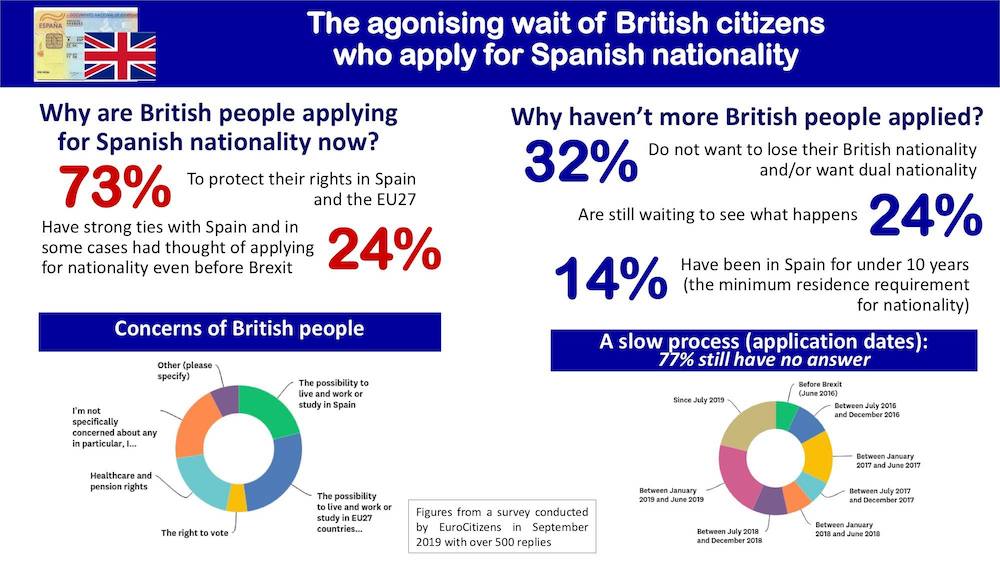
The Spanish process requires two exams including a language fluency exam, on the way to getting the right to even make the official application. Once you get to that point, “approvals appear to be random and have no relation to the date of application,” states the report. About 77 percent of applicants – even some who applied just after Brexit in 2016 – are still in limbo.
This all appears to be due to a rush to apply for Spanish citizenship by expats wishing to remain in the European Union.
• For all expats, Brexit has been about reciprocity. European Union countries are only willing to make special provisions to keep Brits in place if the United Kingdom does the same for their citizens.
It was just assumed everyone would play nice. Then late last year, Spain dropped a bombshell: Spanish Foreign Minister Josep Borrell told the British government that if he doesn’t see evidence the U.K. will assure the rights of 180,000 Spanish expats, the deal in place to protect more the 365,000 Brits will get far less generous.
In March, Spain approved no-Brexit rules regulating all aspects of daily life including pensions, university degrees, driving licenses, healthcare and work permits. But that decree gives the Brits two months post-Brexit to reciprocate.
If they don’t? We don’t know. But the implication is a lot of old Brits getting on slow boats back to Blighty.
El Pais in English has the best post.
• Ah, reality raises its ugly head again. Brexit is all about excluding “The Other” whether the other is from Poland, the Caribbean or India. But the reality of the Global War for Talent has the Tory government reversing its decision to yank the 2-year post-graduation grace period for students.
In September 2019, the British government announced a “new” two-year post-study work visa for international students.
Home Secretary Priti Patel stated:
The new Graduate Route will mean talented international students, whether in science and maths or technology and engineering, can study in the UK and then gain valuable work experience as they go on to build successful careers.
The inconvenient truth is, the post-grad visa was abolished by then-Home Secretary Theresa May as she introduced her policy of creating a “hostile environment” for immigrants from Commonwealth Countries, which have the right to vote, but not immigrate.
Give Boris Johnson credit for realizing Britain doesn’t produce sufficient home-grown talent to compete with the United States, China and European Union countries.
• Remember when Home Secretary Priti Patel said freedom of movement for E.U. nationals would end at the stroke of midnight on 31 October?
Just kidding.
Turns out the Boris Bunch couldn’t do that even if they wanted to because – shocker – they can’t get it together enough to institute an actual immigration system anywhere near that date.
Which does not bode well for the U.K.’s post-Brexit future.
So, they’ve added a temporary immigration status:
“After careful consideration, myself, the Prime Minister and Cabinet have therefore agreed that EU citizens moving here after a no deal Brexit will be able to access a temporary immigration status, until the new skills-based immigration system goes live at the start of 2021,” Politico quotes Patel as telling parliament on Wednesday.
And for the record, Patel uses the reflexive (and incorrect word order), which drives us crazy. Using the reflexive pronoun, you can love yourself, hate yourself or embarrass yourself, but it’s, “The prime minister, cabinet and I agree that E.U. citizens moving here …”, not “Myself agrees that E.U. citizens moving here ….”
Jeez, they can’t even get that right.



